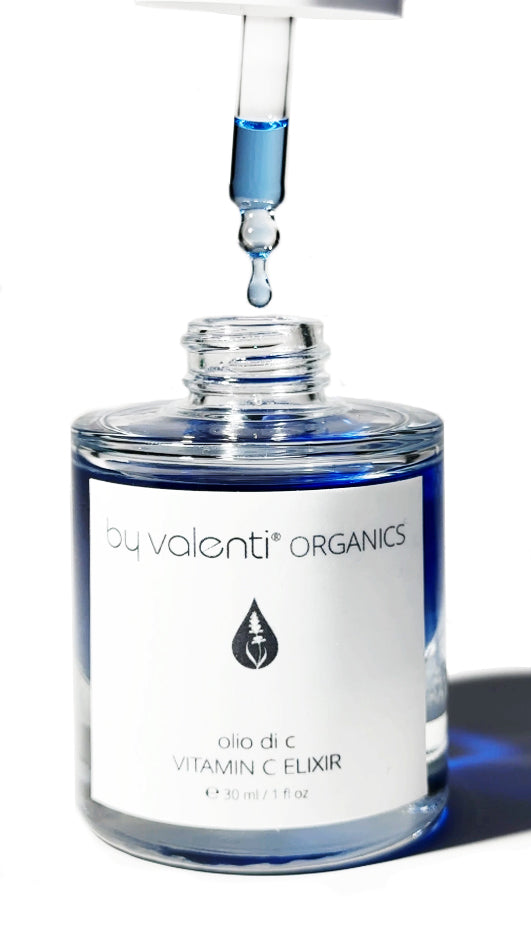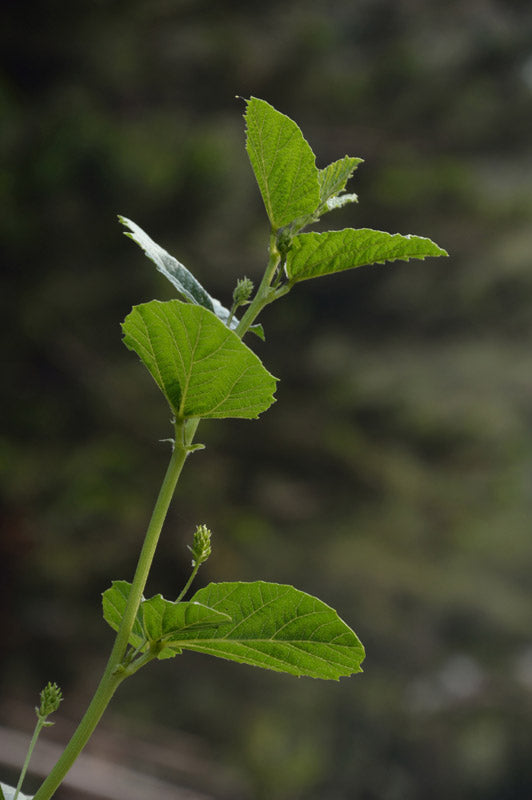We're over the moon with this one! A long time coming and it's finally here!
Our New! Bakuchiol Smoothing Serum, is a gentle yet effective natural compound often touted as the only retinol alternative, that visibly rejuvenates skin, without any of the nasty side effects retinol is known for.
By Valenti Organics Bakuchiol Smoothing Serum features 1% Sythenol® A Bakuchiol in its formula, making it a completely safe, potent and natural anti-ageing serum, powerful and gentle enough to provide the same exact result retinol is known for. A beautiful golden honey color serum, with a blend of exquisite skin loving nourishing vegetable oils and emollients: Jojoba Seed Oil, Moriche Palm Fruit Oil from Venezuela, Camellia Seed Oil, Olive Squalane, Bisabolol, and Vitamin E. Delicately scented with Bergamot, Lavender, Egyptian Geranium Rose essential oils, and Seabuckthorn CO2.
Clinical studies have shown Bakuchiol is:
- Effective active agent against blemished skin,
- Regulates & balances sebum production,
- Anti-aging and anti-wrinkle,
- Reduces hyperpigmentation just as retinol,
- Stimulates collagen production,
- Maintains high level of elastin naturally produced in the skin.
Skin Problems
Uneven skin tone; Blemished, or acne prone skin; Early or advanced signs of ageing; Excess sebum production.
Skin Types
Suitable for all skin types. Recommended for mature skin.
Appearance
Lightweight, nourishing and easily absorbed bright honey colored dry oil.
Active Ingredients
1% Real Bakuchiol.
Inactive Ingredients
Olive Squalane (Squalane), Caprylic/Capric Triglyceride, Organic Jojoba Oil (Simmondsia chinensis), Moriche (Buriti) Palm Fruit Oil (Mauritia flexuosa), Organic Tea Seed Oil (Camellia oleifera), Bisabolol, Vitamin E (Non-GMO Mixed Tocopherols), Organic Lavender EO (Lavandula angustifolia), Organic Bergamot EO (Citrus bergamia), Organic Egyptian Geranium Rose EO (Pelargonium graveolens), Seabuckthorn Berry CO2 (Hippophae rhamnoides).
What IS Bakuchiol.
Bakuchiol is the INCI name of a refined meroterpene extracted and isolated by Sytheon from the seeds of the Babchi plant — Psoralea corylifolia. It was first isolated in 1966 by Mehta et al. and was given the the name Bakuchiol based on the Sanskrit name of the plant, Bakuchi.
Although the molecule has been known for well over 50 yeas, its first commercial use in topical applications was researched and implemented in 2007 by Sytheon, introducing it to the market as Sythenol® A with the INCI name Bakuchiol.
Where is Bakuchiol extracted from?
The molecule bakuchiol of its identical INCI name is extracted from only the seeds of the Babchi plant – Psoralea corylifolia, a leguminous plant endemic to India, the Himalayan regions of Pakistan and China. The whole plant has been used in Ayurveda and Chinese traditional medicine for centuries, to treat a variety of diseases, but the seeds of the plant have significant medicinal properties, and have been used to treat a number of skin diseases, including but not limited to psoriasis and even leprosy.
What is NOT Bakuchiol.
Bakuchiol is NOT a plant extract nor it is water based.
Bakuchiol is not a plant extract, and it is not a water based ingredient. Bakuchiol is a hydrophobic brown to golden in color oil soluble ingredient, obtained through monomolecular extraction from the Babchi seeds — mono = one, meaning that only one molecule, the bakuchiol molecule, is extracted.
The final ingredient is a 99% pure bakuchiol photo-stable active ingredient.
It is important for consumers to understand what is and what isn't Bakuchiol. There are a number of products in the market allegedly featuring Bakuchiol as their active ingredient, however misleadingly disclosing it as bakuchiol extract or similar in the list of ingredients.
There's no such thing as Bakuchiol Extract.
What some brands and suppliers call or disclose as Bakuchiol extract, is actually Bakuchi fruit (Psoralea corylifolia leguminosae) extract — this is why it's extremely important for formulators to name and disclose ingredients by their correct name. (1)
What's the difference?
1- The TRUE Bakuchiol
Bakuchiol is a meroterpene 99% pure photo-stable, monomolecule oil soluble ingredient. Bakuchiol is the INCI name of Sythenol® A with the CAS number 10309-37-2. Its suggested use level is of no more than 1%. Because bakuchiol is photo-stable it can be applied during the day, as sun exposure won't render it photo-toxic.
2- Bakuchi fruit (Psoralea corylifolia leguminosae) extract
Bakuchi fruit (Psoralea corylifolia leguminosae) extract, Bakuchi fruit (Psoralea corylifolia) extract, sometimes misleadingly referred to and sold as bakuchiol extract or bakuchi extract, is a water-based photo-toxic ingredient, that is not pure, and contains very little bakuchiol if at all. The suggested use level for this ingredient is 5% - 15%. Because of how photo-toxic this ingredient is, it is not recommended to be applied during the day.
P. corylifolia extract contains numerous phytochemicals, including flavonoids (neobavaisoflavone, isobavachalcone, bavachalcone, bavachinin, bavachin, corylin, corylifol, corylifolin and 6-prenylnaringenin), coumarins (psoralidin, psoralen, isopsoralen and angelicin), meroterpenes (bakuchiol, and 3-hydroxybakuchiol). (2)
The manufacturers of this ingredient don't actually disclose how much bakuchiol (the molecule that provides the actual skin benefits) is in the final ingredient, just that an extract is prepared from the fruits, with no much reference as to how it is extracted, with one exception were a reference is made to being extracted with a solvent, but no mention of what solvent is used. The potential for solvent residue in this ingredient is of concern.
Depending on the manufacturer, and the suppliers the ingredients list are disclosed as Bakuchi fruit extract (sometimes misleadingly bakuchiol), water, glycerin, and a variety of preservatives. The CAS numbers for this ingredient are multiple, as this is a multi ingredient product, and varies greatly. One of the suppliers we found, disclosed the following CAS numbers for this ingredient: 56-81-5, 7732-18-5, n/a, 122-99-6. What is of concern is that all or the majority of the suppliers of this ingredient disclose the CAS number of bakuchiol among the glycerin and water, with one exception claiming no CAS number for the ingredient exists (few lines above).
Since Bakuchiol is a monomolecule, with its own CAS number and it is hydrophobic, meaning it doesn't mix with water, and this extract is water soluble, then this ingredient doesn't contain bakuchiol at all, regardless of what both the manufacturer, the suppliers and the brands might claim.
3- Babchi (Psoralea corylifolia leguminosae) Oil
To make matters even more confusing, there is a third ingredient extracted from the plant called Babchi (Psoralea corylifolia leguminosae) Oil, which is a carrier oil extracted by cold pressing or solvent extracting the oil from the seeds of the plant. Just like with the extract above, this oil is not pure and doesn't contain much of the actual Bakuchiol. Because of how photo-toxic this ingredient is, it is not recommended to be applied during the day. Depending on how this oil is extracted, the potential for solvent residue in this ingredient is of concern.
Both the Bakuchi fruit (Psoralea corylifolia leguminosae) extract, and the Babchi oil mentioned above, contain high levels of psoralens, — Psoralenes and Isopsoralenes — which are photomutagenic and photocarcinogenic compounds. Applying products containing these compounds during sun exposure will increase the likelihood of developing skin cancer, among other skin conditions. Babchi extract and Babchi oil extracted by solvent extraction, pose an additional health risk, as the process leaves high concentrations of hexane (a neurotoxin) or any other solvent behind.
Topical applications of Psoralens are known to cause skin rashes, itching, burning, stinging, redness, hives, swelling, skin pain, among other side effects, and when exposed to sun or UV radiation, can cause sunburn, and blistering.
Skin Benefits of Bakuchiol and Why it is Compared with Retinol
Bakuchiol has been studied extensively and it's a proven retinol substitute in skincare. It protects and restores the skin. It's a potent anti-ageing ingredient, fighting the first signs of ageing, whilst improving the quality of skin that has already being environmentally damaged by sun exposure and contaminants. (3)
In one of the clinical studies, there was significant improvement in lines and wrinkles, pigmentation, elasticity, firmness and overall photo-damage, with no irritating side effects. (4)
In another study Bakuchiol has been clinically proven to be more efficient than salicylic acid and to reduce acne by 48% after 6 weeks of daily use. (5)





